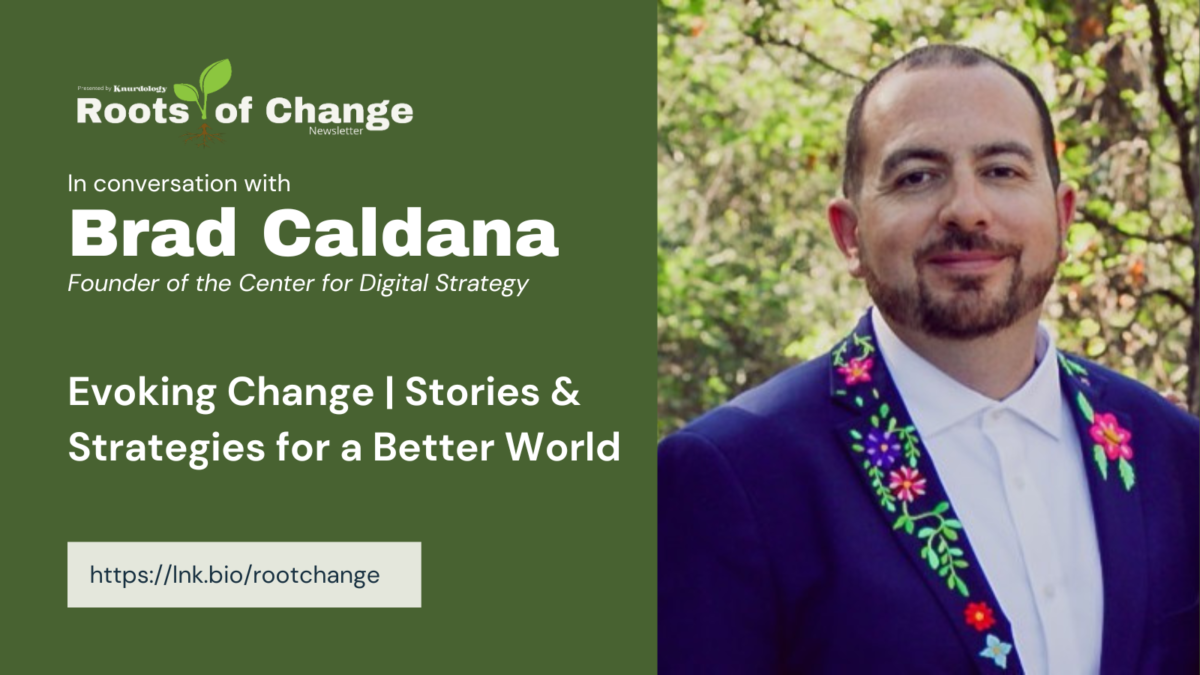Rewilding Communications
When you work in the wide-ranging advocacy space, you are bound to meet a variety of characters. Especially when you do things a little bit differently. Since founding Roots of Change in 2020, I intentionally have chosen to build connections who are challenging traditional thinking in this new era.
What I love most about my work is that it intersects into so many different realms: social justice, storytelling, emergent strategy, grassroots organizing, somatics, corporate marketing, systems thinking, spirituality, regenerative thinking, political organizing, and more.
And that’s what I aim to do with our interview series. Bring some really cool people together to offer different perspectives and actionable ways we can communicate to achieve the change we are fighting for today.
Our first featured interview is with an expert who’s been at the forefront of political communications since his time as the first-ever Digital Training Director for Obama’s 2012 presidential campaign.
Digital that Meets Our Moment
I sat down with Brad Caldana, the Founder and President of the Center for Digital Strategy, as he was making the final preparations for the Social Media Summit starting today! During our conversation, we discussed the chaos in the political and digital landscapes, the importance of storytelling for social impact organizations, and the need for organizations to adapt their digital strategies.
It’s chaos on every level. We have fully entered the lived repercussions of climate change. And 20% or 30% of the country has been very brainwashed, right? That makes them the majority of the Republican Party. The party is not that big, but 20-30% is enough to do damage in the political system. The world’s biggest greenhouse emitters have a major party that still denying while people are dying.
The compounding global crises of climate change, the COVID-19 pandemic, Russian wars, and the chaotic state of the digital space have impacted every sector, especially advocacy work.
Simple changes to algorithms and policies have had major ripple effects. When Apple announced a change where users could opt-in to digital tracking, it limited an organization’s ability to use data to reach its audience. Facebook’s political ad restrictions altered how political organizations can target their ads.
How I feel about this space? It’s chaos. And it’s not just Musk and Twitter, it’s the rise of creator in the social space. There are these digital creators creating a wide variety of content, right? And growing relationships in a way that organizations aren’t. So it’s interesting that there’s a ton of opportunity, but most organizations are still behind the ball in their digital strategy. That’s doubly compounded by funders pulling back. At a time when people should be investing and growing and thinking about how do we build.
The Power of Storytelling in Digital Work
Talking about the rise of creators, sparked an exploration of how non-profits can use storytelling, particularly through video platforms, to create a deeper level of engagement with their audience.
We lamented that corporate marketing has used storytelling highly effectively, but social impact organizations really have the unique advantage of telling genuine and impactful stories. Brad sees storytelling as playing into every aspect of an organization’s work, forming deep connections with supporters and volunteers.
In the corporate space, they’re good at storytelling, but then it ends. For us, it’s the beginning. The storytelling should be the beginning of a deepening of engagement. We’re trying to move people to action through story or to get them to come join us, right? Once they’ve joined us, though we do want to keep them. We want to keep reinforcing the stories.
According to Brad, storytelling has the ability to reach individuals on different levels and engage different kinds of learning styles: visual, auditory, experimental, etc. He shared fascinating research from the Harvard Business Review that demonstrates how storytelling activates other parts of the brain, making it an effective tool for communication and engagement. He encouraged organizations to harness the power of storytelling to inspire action and foster a sense of community.
For experimental learners, story allows them to put themselves in the experience. They can actually see the experience in their mind because it’s told as a story. When you’re thinking about getting someone to understand an issue or wanting to get involved in an issue, a story is just this amazing bridge between all four [learning styles]. That’s the science of the power of story.
While some organizations may feel overwhelmed thinking about developing a storytelling strategy, it doesn’t necessarily require a large financial or time investment. He suggested starting with a simple question-and-answer format, where supporters and individuals impacted by the cause can share their personal stories. These stories can be captured through written, video, or audio formats, allowing for a more authentic and emotional connection with audiences.
Building Relationships
A strategy centered on storytelling is much deeper than one-time interactions. It is about building relationships and fostering long-term engagement. Brad emphasized the importance of incorporating stories into the entire journey of engagement, keeping supporters connected and motivated to take further action.
By humanizing issues and showcasing the impact of donations and support, organizations can create a more compelling and relatable narrative. Brad believes that embracing storytelling as a core strategy is vital for organizations to thrive in the ever-evolving digital landscape.
As we navigate the complexities of our current political and digital climate, it is evident that storytelling has the potential to forge meaningful connections and drive positive change.
About Brad
Brad Caldana is the Founder and President of the Center for Digital Strategy where he hosts training and strategy conversations to empower organizations and campaigns around the world. He also was the first Digital Training Director for a presidential campaign in President Obama’s 2012 campaign.
- Follow Brad on LinkedIn
- Explore The Center for Digital Strategy
- Register for the Digital Campaign Accelerator
- TODAY! 🥳 Register for the Social Media Summit with code ‘RootsofChange20’

